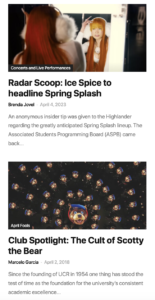Content Warning: This article contains mentions of racism, slurs and sexism.
In the past, The Highlander, the University of California, Riverside’s school paper, has taken part in the tradition of publishing April Fools’ issues, similar to the one this article is found in. Releasing satirical and gag issues on April 1, spreading “playful” misinformation. Articles that were published include fake Spring Splash lineups and big celebrity visits, accompanied by coverful and magazine-like front covers.
April Fools’ Day, full of pranks and gags. One of the only times that the News Team and local papers are able to let loose and have a little fun in their coverage. Universities across the nation take part in the tradition of releasing April Fools’ issues, satirical press coming in clutch.

In 2004, two universities in the state of Pennsylvania faced massive ramifications due to the content for their April Fools’ publications. The colleges in question, Carnegie Mellon University (CMU) and the University of Scranton, ended up with both of their publications being suspended. Thus ended the reign of The Aquinas and The Tartan for that academic year.
The Aquinas, the University of Scranton’s student-run newspaper, pulled its issue after “receiving a complaint that the paper had printed libelous material.” An article released by a local paper, The Tribune, claimed that the paper contained reference to a priest breaching clerical celibacy and some off-color jokes. A spokesman for the University of Scranton elaborated that “the general sense was that it was over the top.”
As a result of feedback from students, faculty members, alumni and news media professionals, the university suspended publication for the paper immediately, and established conditions that must be met before the board could resume publication.
CMU’s paper, The Tartan, faced backlash from the public due to a “racially charged cartoon” that they had released. The Tartan, or The Natrat, for the day of April Fools’, approved publication of a comic that “contained racist and other offensive content.” The comic in question depicted a mouse and a goat, benign by themselves, but then, the goat said a slur. While many claimed that the offensive part of the comic was the slur that was stated, the overall text of the comic seemingly “celebrates the killing of African Americans.”
As a result of the publication, the cartoonist was fired, The Tartan’s editor-in-chief took a leave of absence from the University as a whole, the top editor and managing editor resigned and the student editors suspended publication for that year.
A few days after the publication, students at CMU gathered to rally against the April Fools’ publication. An article by TribLIVE, explained that the reason they chose to do so was because “a character in the cartoon talks about running over blacks and uses a racial epithet.” Students at the university commented, with many sharing their feelings about the publication being “a disgrace” or that it was “pretty blatantly racially motivated.”
A similar situation arose once again in 2016, when the University of Wisconsin-Superior’s (UWS) The Promethean released their April Fools’ issue. According to the Student Press Law Center, their special edition, named the “The Pessimist” for the week of, upset some readers who claimed that “the jokes went too far,” with university officials agreeing.
The issue contained articles about past UWS student and celebrity Arnold Schwarzenegger returning to teach courses, referencing minority stereotypes, strategies for attracting women and much more. A graduate student at UWS took the initiative and filed a complaint against the paper, claiming there was an “inadequate notice of satire” and that “without directly expressing that the edition is satirical gives the impression that it is not, because that is what the readers have come to expect.”
The graduate student put emphasis on the article about strategies to attract women, titled ”Sure Fire Pick-Up Lines For Those Who Lack ‘Game.’” She expressed that she found the list to be “hurtful, sexist and misogynistic;” the list containing statements such as “Please tell your tits to stop looking at my eyes.”
According to the SPLC article, the editor-in-chief at the time released a statement that stated, ”We have collectively published this paper today to the delight of some and the dismay of others. We publish it unapologetically in honor of the freedom of the press and to the often forgotten rights of the press guaranteed to us under the Constitution of the United States.” However, the link provided to the statements released by the editorial board on Facebook at the time lead to a page that states “This page isn’t available at the moment.”
These are just two examples of the many repercussions that universities face when releasing their April Fools’ publication. A deeper dive into the world of satire and misinformation would reveal that it happens time and time again, with many papers retracting stories with harmful content.







